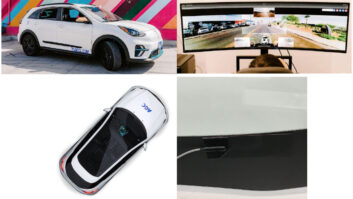ENGLEWOOD, COLO. –
The Fox, NBC
and CBS broadcast TV networks made their
feelings known about Dish Network’s new
Auto Hop commercial-skipping feature by filing
lawsuits against the satellite-TV provider
for violating copyright and retransmission
agreements.
Earlier, Dish filed a pre-emptive suit in
New York claiming the networks’ threats of
litigation were stifling its ability to innovate.
Upon announcing the Auto Hop feature on
May 10 and in its legal argument, Dish said
the feature was an improvement on the fastforward
and 30-second advance system that
has long existed in VCRs and earlier versions
of its own DVRs.
The Auto Hop feature does not alter the
recorded signal in any way, and consumers
are free to watch commercials in recorded
content if they so choose.
At this stage, Auto Hop is designed to work
only with the PrimeTime Anytime component
of Dish’s uber DVR, called the Hopper.
This system automatically records all of
the primetime programming of each of the
Big Four network affiliates each night and
caches them on the hard drive for up to eight
days.
However, the company has said that it may
eventually choose to expand the capability to
other recorded content as well.
Dish’s lawsuit is seeking a declaratory judgment
that it isn’t infringing on any copyrights
and is in compliance with its agreements with
the networks.
“Consumers should be able to fairly
choose for themselves what they do and do
not want to watch,” David Shull, Dish senior
VP of programming, said in a statement. “Viewers have been skipping commercials
since the advent of the remote control. We
are giving them a feature they want and that
gives them more control.”
Fox, NBC and CBS (ABC continues to
monitor the situation before taking action)
claimed in separate suits filed in California
that the Auto Hop service will eliminate
advertising, which represents their primary
means of revenue generation.
In its legal argument, Dish said: “Even
though consumers have had the option, in
one form or another, to skip commercials for
decades, the major television networks are
threatening Dish with litigation to eliminate
Auto Hop, a patented technology that allows
Dish’s paying subscribers to avoid commercials
that they might prefer not to watch.”
Dish said it has contracts with each of
the major networks that authorize Dish to rebroadcast
their signals.
“Dish is required to pay the major television
networks hundreds of millions of dollars per
year in retransmission fees, collected from its
subscriber base, for the right to rebroadcast
those signals — even though the major television
networks provide their content at no
charge to television viewers with an over-theair
antenna,” Dish’s statement said.
Public Knowledge, an advocacy group for
fair-rights use of content, called out Fox for
its actions against the Auto Hop feature.
“It is truly unfortunate for consumers that
Fox has filed suit against Dish Network,” said
Public Knowledge president Gigi Sohn in a
statement. “That suit charges Dish with copyright
violations for the satellite company’s
DVR which allows consumers to skip commercials,
but also against the Sling adapter
(formerly Slingbox) which allows consumers
to stream their TV signal to a laptop at a different
location. This is a frontal assault on home
recording and fair use. Ordinary consumers
are in its crosshairs, while Fox demands technological
stagnation from innovators.”











